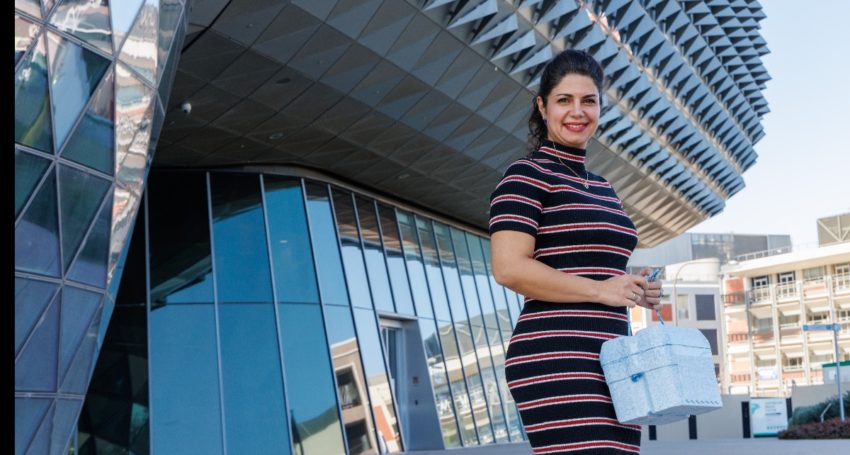SAHMRI’s cancer research is personal – and that’s a good thing
Health & Medical
The leading health research institute is using personalised medicine to customise healthcare to individuals.

Sign up to receive notifications about new stories in this category.
Thank you for subscribing to story notifications.

Prostate cancer is the most common cancer diagnosed in Australian men.
But prostate cancer is not one disease – for the thousands of men diagnosed a year, each has its own characteristics.
“Every patient is unique, and so every cancer is unique,” says Dr Samira Khabbazi from the South Australian Health and Medical Research Institute (SAHMRI).
“When we’re able to study individual men with prostate cancer, we have a much greater chance of developing personalised medicine.”
Personalised medicine is an approach that customises healthcare to individuals. For treating cancer, it means drugs are less likely to create debilitating side effects across the whole body.
Samira is Tissue Collection Coordinator in SAHMRI’s Precision Cancer Medicine theme. Working as part of a national project called the Australian Prostate Cancer BioResource, she does the leg work to collect samples of blood and prostate tissue from South Australian men with prostate cancer.
“Men having prostate surgery provide consent for us to use samples of their blood and tiny pieces of their prostate tissue in this research,” Samira says.
“My desk is on Level 5 at SAHMRI, but when I get a call from the nurses I grab my esky and ice, go down to my car and head off to St Andrew’s hospital to pick up the samples.”
At the hospital, most of the removed prostate gland is used for diagnostics to guide the doctor managing the patient. But the tiny sample reserved for the Australian Prostate Cancer BioResource is enough for scientists to gain vital new knowledge.
“The project is a great collaboration between researchers, patients, nurses, surgeons and pathology services that we hope will make a real difference for men with prostate cancer,” says Samira.
Samira carefully transports fresh prostate tissues back to SAHMRI, where they are immediately biobanked, or cultured in the laboratory for tests with new treatments.
“Based on new knowledge from this project, we hope to improve the survival rate of men with prostate cancer,” says Samira.
“Our results have already led to several clinical trials of new therapies for prostate cancer.”
SAHMRI’s Precision Cancer Medicine theme has a mission to deliver the right cancer treatment for the right person at the right time. In addition to prostate cancer, research programs target leukaemia, myeloma, and bowel cancers.
Also part of Precision Cancer Medicine, SAHMRI’s Paediatric Neuro-Oncology Program focuses specifically on brain and spinal cord tumours in children.
Targeted treatment for these patients will become available through the Australian Bragg Centre for Proton Therapy and Research, currently under construction on the eastern side of the SAHMRI building on North Terrace.
Research at SAHMRI targets many health challenges in addition to cancer. The Lifelong Health theme on Level 6 focuses on gut disease, diabetes, men’s and mental health, wellbeing, stroke and dementia. As part of this theme, Samira’s husband Dr Mohammadhossein Hassanshahi studies blood vessels in health and disease.
Together Samira and Mohammadhossein juggle raising a young son with their busy SAHMRI research schedules.
“We’re lucky to have a childcare spot in the city, so it works,” Samira says.
Additional research themes at SAHMRI focus on Women & Kids and Aboriginal Health Equity (Wardliparingga).
Across the four themes and multiple research programs, SAHMRI researchers make use of the building’s desks and laboratory spaces, research areas, meeting rooms and vital infrastructure to conduct research that is informed by the latest knowledge and technology. They travel in and out of the building to work with hospitals, pathology services and patients to ensure their research is connected to real clinical care.
SAHMRI also houses essential resources and infrastructure that service South Australia, including technology and tools to support research and produce diagnostics, registries to track health data and trends, and centres to translate research into policy and effective health responses, including for COVID-19.
SAHMRI is South Australia’s independent, not-for-profit health and medical research institute. Its primary reason-for-being is to provide service to the community.
SAHMRI researchers work closely with each other and the world’s best medical experts to find better ways to treat, heal and care for people. They are funded by grants from state and national funding bodies, as well as philanthropy
Donations help elevate research, turning discoveries into cures, treatments, better health and longer lives.
Donate today to boost the pace of research at SAHMRI
Jump to next article



